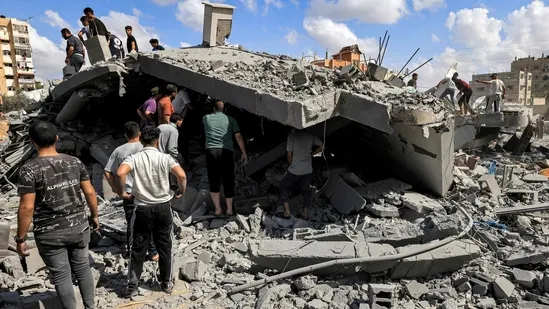
WHO Sounds Alarm on Imminent Collapse of Gaza Health System as Nasser and Al-Amal Hospitals Face Shutdown
The World Health Organization (WHO) has issued an urgent warning about the imminent collapse of the healthcare system in the Gaza Strip, emphasizing that two of the last functioning hospitals—Nasser Medical Complex and Al-Amal Hospital in Khan Younis—are on the brink of becoming non-functional. The organization underscored the growing humanitarian crisis, citing an acute shortage of essential medical resources and escalating challenges in maintaining safe access to health services.
A Critical Lifeline at Risk
In a stark statement, WHO highlighted that Nasser Medical Complex and Al-Amal Hospital are currently the last two operational public hospitals in Khan Younis, a city now home to a large portion of Gaza’s displaced population. These facilities are vital not only for providing essential and emergency healthcare but also for offering specialized services such as surgical operations, intensive care, cancer treatments, dialysis, and blood transfusions.
Their potential closure would have devastating consequences. The loss of these two hospitals alone would eliminate 490 hospital beds, slashing the already insufficient total capacity of Gaza’s health system to less than 1,400 beds—a 40% reduction from what was available before the conflict escalated. This would leave nearly 2 million people with critically limited access to hospital care.
In the Line of Danger
Despite the fact that no formal orders have been issued to evacuate either hospital, the threat level is high. Both hospitals are located within or just outside the evacuation zone announced by Israeli authorities on June 2, 2025. According to WHO, the Israeli military has notified Gaza’s Ministry of Health that access roads to the hospitals will be obstructed, making it increasingly difficult—if not impossible—for patients and medical staff to reach these facilities.
The implications of such restricted access are dire. Medical professionals would face serious risks traveling to their workplace, and patients in critical condition might not make it to hospitals in time. Additionally, movement restrictions and ongoing hostilities severely hinder the resupply of vital medicines, medical equipment, and the transfer of patients to better-equipped facilities. This, in turn, jeopardizes the ability of WHO and its humanitarian partners to sustain healthcare services under already strained conditions.
Overburdened and Underequipped
Currently, Nasser and Al-Amal hospitals are operating far beyond their intended capacity. They are flooded with patients suffering from life-threatening injuries, while simultaneously grappling with a severe shortage of medications, medical supplies, fuel, and even clean water. Healthcare workers are stretched to their limits, working long hours under immense psychological and physical stress, often with the bare minimum of tools and medication.
The WHO warns that the potential collapse of these two key hospitals will exacerbate the already disastrous health crisis in Gaza, eliminating the population’s only remaining access to public emergency care in the southern part of the territory. The impact on children, the elderly, patients with chronic illnesses, and those needing emergency surgery could be catastrophic.
No Hospitals Left in the North
The situation in northern Gaza is already beyond critical. According to WHO, there are no functioning hospitals left in the north, leaving hundreds of thousands without access to even the most basic medical care. Patients in urgent need of treatment—including trauma victims, pregnant women, and cancer patients—have nowhere to turn for help. The organization emphasizes that this pattern of healthcare infrastructure destruction must end immediately.
Health System on the Brink of Collapse
Over the past 20 months, WHO, along with its humanitarian partners and local health workers, has worked tirelessly to maintain some semblance of healthcare services in Gaza. Despite facing enormous challenges—ranging from repeated attacks on medical facilities to the systematic denial of aid and humanitarian access—these efforts have kept parts of the health system operational.
However, WHO now warns that the cumulative effect of hostilities, access restrictions, supply shortages, and the targeting of health infrastructure is pushing the entire healthcare network toward irreversible collapse. Without immediate intervention, even the limited health services still functioning may disappear entirely.
An Urgent Appeal
WHO is calling on all parties to the conflict, and the international community at large, to take immediate action to prevent the closure of Nasser Medical Complex and Al-Amal Hospital. The organization’s appeal includes:
- Ensuring the protection of all health facilities, staff, and patients from military actions.
- Maintaining free and safe access to hospitals for both healthcare workers and patients.
- Facilitating the safe delivery of essential medicines, fuel, and medical supplies through all available humanitarian corridors.
- Preventing the militarization of healthcare facilities and respecting their status as neutral zones under international humanitarian law.
“Patients seeking refuge and care to save their lives must not risk losing them trying to reach hospitals,” WHO stated. “Hospitals must never be militarized or targeted.”
The organization stresses that any further degradation of the health system will not only result in a humanitarian catastrophe but also breach international humanitarian law, which mandates the protection of healthcare workers and infrastructure during armed conflict.
A Systematic Destruction of Health Infrastructure
The dire situation in Gaza reflects what WHO describes as a relentless and systematic decimation of the territory’s health infrastructure. This destruction has come in the form of direct attacks, forced evacuations, and bureaucratic barriers to delivering aid. Rebuilding what has been lost will require years, possibly decades, of coordinated global effort—but the first step is to stop the bleeding.
Immediate action is crucial, WHO stresses, not only to save lives today but to prevent a public health catastrophe tomorrow. Without functioning hospitals, Gaza risks seeing an explosion in preventable deaths, untreated infections, and communicable disease outbreaks.
The WHO’s latest call to protect Nasser Medical Complex and Al-Amal Hospital is a desperate plea to safeguard the last remaining pillars of Gaza’s collapsing health system. As the region teeters on the edge of a full-blown humanitarian disaster, the international community is faced with a moral and legal imperative: to uphold the principles of human dignity, medical neutrality, and the right to health.





